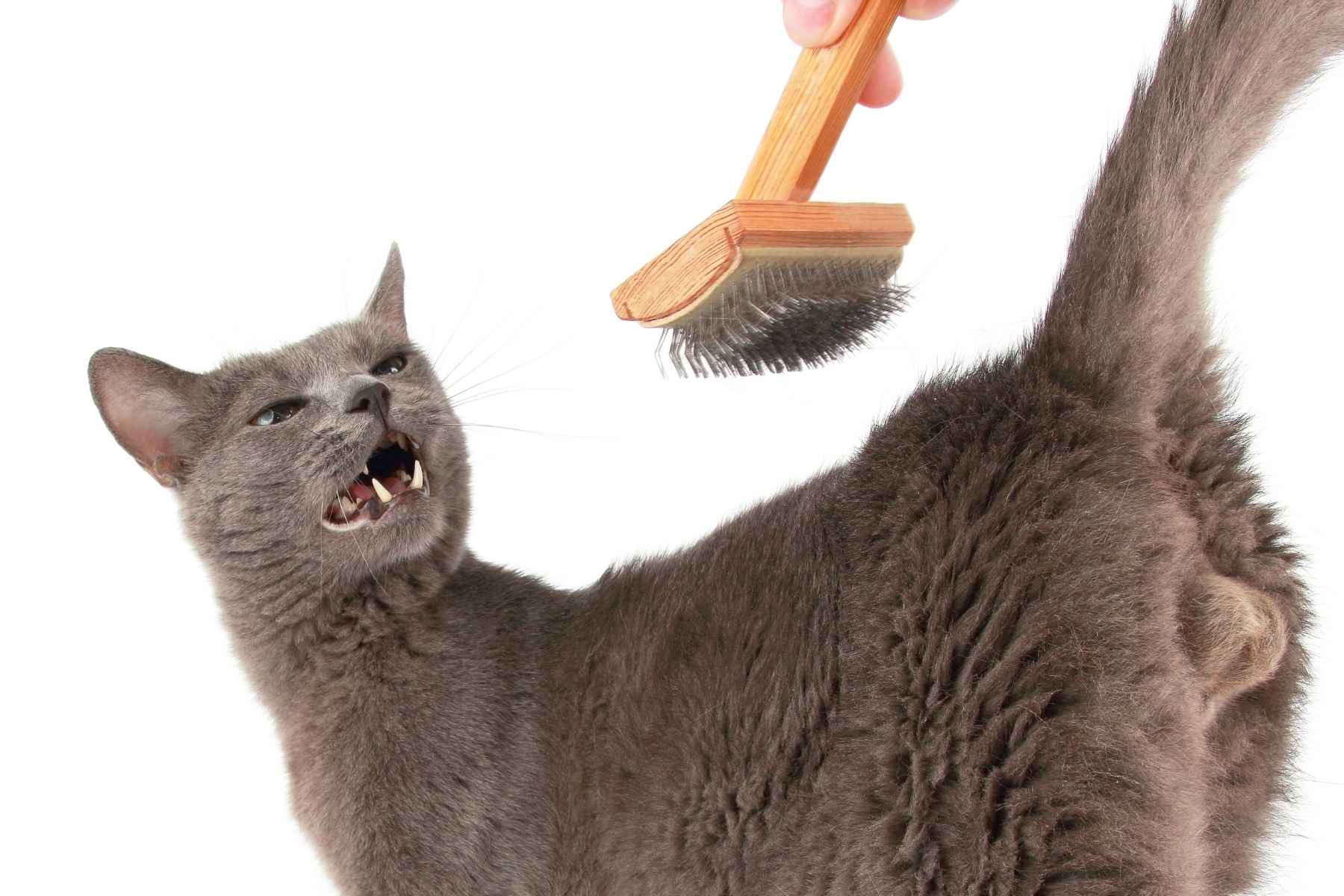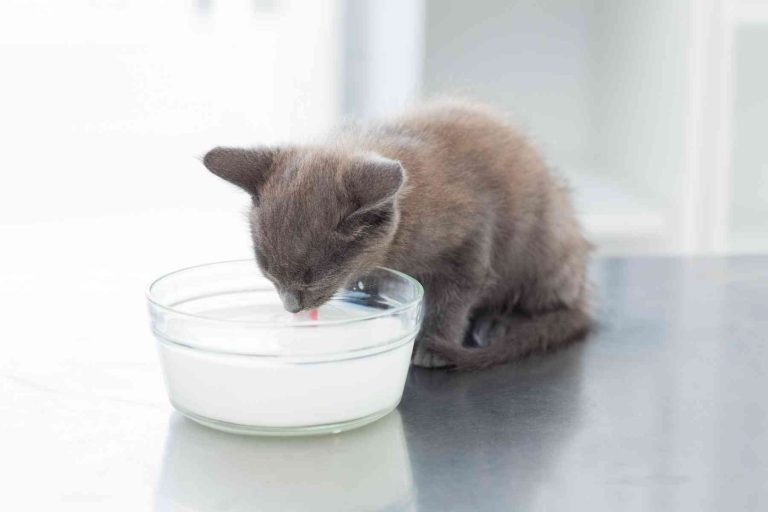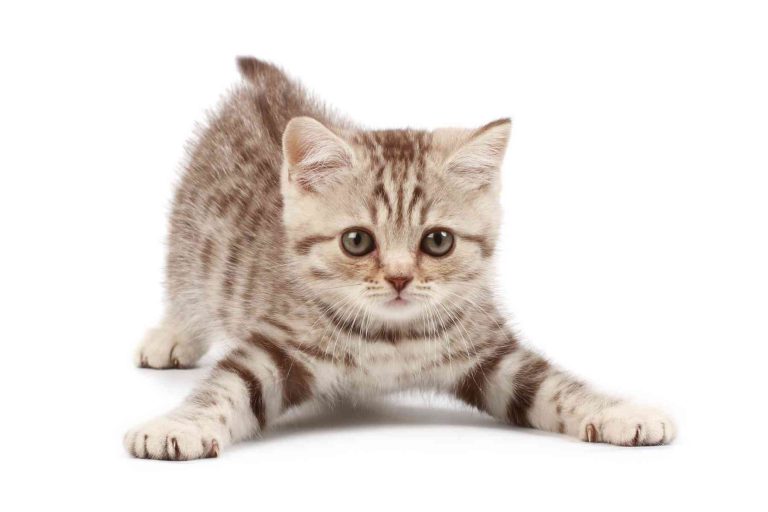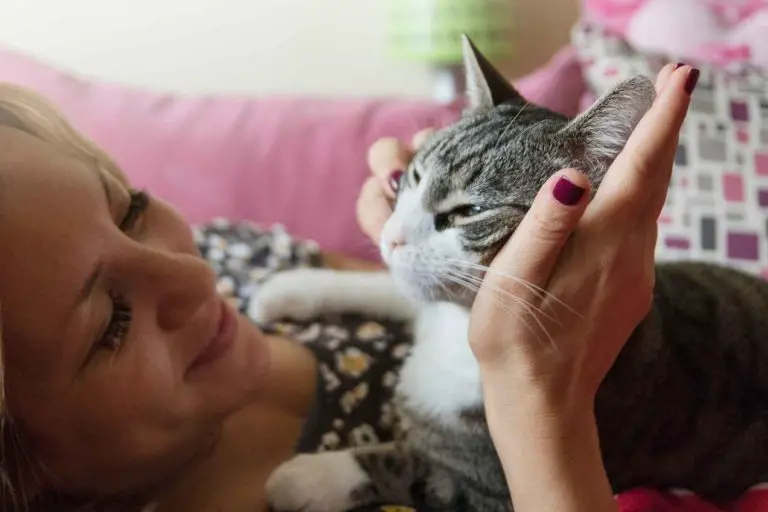Why Do Cats Gag At The Sound Of A Comb?

Have you seen the viral footage of cats around the world gagging at the sound of their owners running their fingers down a comb? It’s unbelievable to watch the reaction of so many felines to this seemingly innocent sound, so why does it happen?
Well, cats possess excellent hearing, including high frequency sounds much higher than those that a human can hear. The unique frequency created by the comb (which is similar to the sound of a mouse chattering its teeth) causes your cat’s voice box to vibrate, and in response, they gag at this unusual sensation.
Continue reading to discover why cats gag at the sound of a comb, how these high-pitched frequencies affect your feline, and why certain noises irritate your cat. Plus, you’ll learn when gagging is normal and when you should refer your cat to a vet.
Why Do Cat’s Gag?
There are several reasons why a cat gags. One of the most common is hairballs, though gagging could also signify infection or inflammation.
If something touches a cat’s larynx – or throat box – this will cause the feline to gag. In general, the purpose of the movement is to eject the irritant from the cat’s throat; this object might be real or perceived.
What Is Gagging?
It is easy to confuse a gag with a cough or a sneeze, but these are three different processes. A cough comes from the lungs, while stimuli in the nose trigger a sneeze. But neither of these cause a cat to gag.
A cat gags when something touches their larynx. This creates a cranial nerve stimulus, to which the cat responds by gagging.
Is It Normal For A Cat To Gag?
It’s normal for cats to gag; it’s part of their evolution to help reject anything harmful that they may have ingested. This fairly common behavior is usually nothing to worry about unless it becomes excessive.
Why Do Cats Gag At The Sound Of A Comb?
Cats gag at the sound of a comb because they have a heightened sense of hearing. This keen sense aids in their hunting abilities, but it also makes their ears sensitive to a number of noises, especially high-pitched frequencies.
Many of the cat’s prey animals use these high-frequency noises to communicate with one another, which is why cats are so sensitive to them.
The high-frequency noise causes your cat’s larynx to vibrate, making them gag. In older cats, this can trigger FARS or feline audiogenic reflex seizures.
What Are Feline Audiogenic Reflex Seizures?
Scientists recently discovered FARS, a form of epilepsy that is particularly common among older cats as well as Birmans.
A reflex seizure is one that is triggered through a particular stimulus – either environmental or internal. An audiogenic seizure is one caused by a specific sound. Vets and other professionals now recognize FARS as a distinct syndrome.
It is still unknown how this condition develops, though felines are typically 15 years or older when they experience it. As cats age, they lose the ability to hear many low-pitched sounds. For this reason, high-pitched sounds could be even more startling.
Why Do Some People Refer To FARS As “Tom and Jerry Syndrome?”
Some people refer to FARS as Tom and Jerry Syndrome because of the popular cartoon in which Tom – the cartoon cat – experiences involuntary reactions to different stimuli and sounds.
Is The Sound Of A Comb Harmful To My Cat?
Exposure to high-frequency sounds every once in a while, such as running your fingers over a comb, shouldn’t cause any significant harm to your feline.
That’s not to say it doesn’t irritate your cat, though. Imagine someone running their fingers down a chalkboard to aggravate you purposely – it’s not a particularly kind thing to do. Cats don’t enjoy gagging, so while a one-off noise is harmless enough, constantly triggering them with various sounds is a little mean.
Do Other Sounds Trigger A Reflex Action In Cats?
It’s not just the sound of your fingers running along a keyboard that can trigger the automatic response of a cat. Other sounds can trigger a similar effect. These include:
- Crinkling a piece of tin foil
- Tapping a glass
- Tapping a metal spoon on a ceramic bowl
- Crinkling a plastic bag
- Keys or coins clinking together
- Tongue clicking
What Sounds Do Cats Like?
While high-frequency sounds can make a cat extremely uncomfortable, a range of noises will help relax your cat.
Cats love music, especially that which composers specifically create for the species based on the temp and frequency of cat vocalization.
They also love the sound their toys make as you bounce and throw them around. The squeaky noises stimulate prey during a play session that helps your cat practice its hunting skills.
This last sound will come as no surprise to a cat owner – felines love the sound of the food. Whether it’s dry food rattling in its packet, or the sound of the food emptying into their bowl, these sounds are synonymous with a reward and can even induce a purr from your cat.
Why Are Cats So Sensitive To High-Frequency Noises?
In the wild, cats are fearless predators who rely on their robust hearing to catch their prey. For this reason, cats evolved a far greater range of frequency detection than humans. And it is this wide range of hearing that helps a cat survive in the wild.
While humans can only hear sounds in the range of 30-19,000 Hz, cats can hear frequencies ranging from 55-77,000 Hz, representing one of the broadest hearing frequencies among all mammals.
This expert sense provides cats with an edge when it comes to hunting, but it also means that they pick up several high-frequency sounds within the human environment that we can’t hear but are pretty annoying for our felines.
When we run our fingers over a comb, it creates a high-frequency noise similar to that of a mouse chattering its teeth. This particular frequency causes their larynx to vibrate, similar to what happens when they purr.
Do Certain Cats React To The Sound Of A Comb Differently?
Cats each possess a unique personality, which means they react to circumstances differently. Some will get over it almost instantly, while others may become aggressive or wary toward you.
Cats who are more than ten years old are likely to have a stronger reaction than younger cats, as they become more sensitive to high-pitched noises over time. And older cats are also more likely to experience seizures from these stimuli.
Why Does My Cat Keep Gagging?
If your cat gags several times in a row, it could signify they have a hairball. As they groom their coats, fur gathers in their mouths and throats, and if they swallow too much, they could end up coughing up a hairball.
Their gagging could be a way of trying to “cough up” this furball. However, there is a range of slightly more sinister reasons why your cat could be gagging (without throwing up), and it’s essential to know the difference between each.
These include colitis, asthma, irritable bowel obstructions, bowel obstructions, or tumors.
Signs And Symptoms Of Medical Disorders That Cause A Cat To Gag
| Condition | Symptoms |
| Hairball | Constant gagging, retching, and vomiting without retrieving a hairball. Loss of appetite. Constipation or diarrhea. Lethargy or slowed movements. |
| Colitis | Gagging or vomiting. Diarrhea with mucus or blood. Constipation or straining when defecating. |
| Asthma | Gagging or vomiting. Wheezing or difficulty breathing. Open-mouthed breathing. Rapid breathing. Coughing. |
| IBS (Irritable Bowel Syndrome) | Gagging or vomiting. Sensitive abdomen or bloating. Gas. Diarrhea with mucus. Loss of appetite causing weight loss. |
| Bowel Obstruction | Gagging or vomiting. Loss of appetite and refusing to eat. Lethargy and sluggish movements. Low temperature. Crying or meowing excessively. Not wanting to lie down. |
| Tumors | Gagging. Coughing or difficulty breathing. Difficulty eating and swallowing. Difficulty urinating or defecating. Bodily discharge or bleeding. Loss of appetite, leading to significant weight loss. Vomiting or diarrhea. |
Don’t panic, though. Furballs from their grooming cause most cat gagging, and they’ll stop once they cough up the hair.
How Can I Help My Cat To Stop Gagging?
If your cat gags and coughs a lot, something may be lodged in its throat. Gently massaging the throat can help to relax the muscles and stop any spasms.
You can also try placing a hand over your cat’s nose, which will force them to swallow and may help to dislodge whatever is stuck.
Failing this, you’ll need to get your cat to the vet, particularly if they show any signs of distress or have trouble breathing.
Final Thoughts
Cats are natural predators who develop an immense sense of hearing to help them catch their prey. As many of their prey species communicate in high-frequency sounds, your feline is most attuned to this type of noise.
When you run your fingers across the teeth of a comb, it stimulates a cat’s larynx to vibrate – much as it would when they purr. And this strange sensation (unprompted by them) causes them to gag in response.






